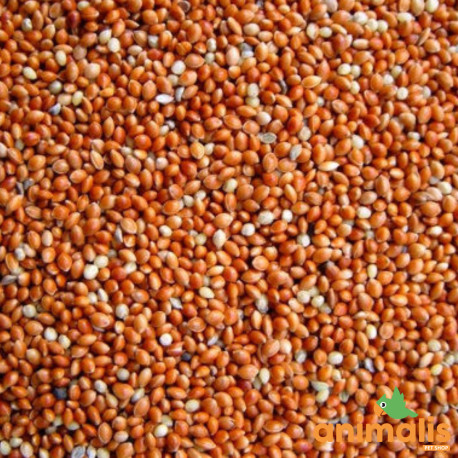



Reference: MILLETROUGE1KG
The flaxseed consists of 40 to 45% oil and 25% protein. Flaxseed preserves very well. It contains, in particular, two fatty acids with similar names (both derived from the word "lin"), linolenic acid (an omega-3) and linoleic acid.
The seed is used in animal feed, particularly for laying hens for which an increase in the omega-3 content of the eggs is desired.
Due to these properties, this seed aids digestion.
Dari, also known as sorghum, millet, is a variety of seeds that is attached to millet varieties. The dari has the size of the hemp seed. The seed is native to the warm regions of Australia, Asia, Africa and South America. There are three varieties: white, yellow and red-brown dari. It should be noted that light dari is given more value than red-brown dari. As far as the food value in particular is concerned, there is not the slightest difference. In addition, the red-brown dari is well appreciated by agapornis. Dari can be compared to wheat in terms of starch content. The seed has a favorable composition of amino acids. The protein present in the dari has a particularly high leucine content.
High-quality seeds with high fat content
- With a high content of vitamin E, B9, B5, B6, B1, B2, B3, and vitamin K.
- It has antioxidant properties.
- Excellent energy contribution.
- Rich in calcium, potassium, magnesium, phosphorus, proteins, zinc, thiamine, pectin (cleanses the body).
The wild rose is a wild rose bush whose rose hips are consumed in autumn and are very rich in vitamin C.
Niger seed is a bird seed rich in phosphorus and calcium.
Niger seeds (or nyjer seeds) are fine seeds rich in oil.
They come from Guizotia abyssinica (also called Oleiferous Guizotia).
Niger is very popular with most birds, goldfinches and tarins love it.
Niger is one of the few bird seeds with a good calcium/phosphorus ratio.
They have the property of binding to minerals such as calcium, iron and zinc and making them less bioavailable.
Premium high-quality, high-fat seeds
- With a high content of vitamin E, B9, B5, B6, B1, B2, B3 and vitamin K.
- It has antioxidant properties.
- Excellent energy contribution.
- Rich in calcium, potassium, magnesium, phosphorus, protein, zinc, thiamine, pectin (cleanses the body).
Spinach seeds contain vitamins A, B1, B2, B3, B7, B9 and C, mineral salts and trace elements. Regular consumption helps to strengthen the feathers.
Thanks to its small black or pretty electric blue seeds, the poppy is recognizable among thousands. A cousin of the poppy, the poppy is known for its content of good fats and micronutrients essential for the proper functioning of the body.
Properties of Pine or Larix seeds.
Anti-inflammatory, analgesic, antispasmodic,
Antiseptic, anti-infectious (pneumococci),
Decongestant of the small pelvis and prostate,
Diuretic
Expectorant, tonic for the respiratory organs.
Clover stimulates the immune system and slows down cellular ageing through its excellent antioxidant properties. Rich in vitamins B, C, E and provitamin A.
Dari, also known as sorghum or millet, is a variety of grain that is related to millet varieties. Dari is the size of a hemp seed. The grain originates from the warm regions of Australia, Asia, Africa, and South America. There are three varieties: white dari, yellow dari, and reddish-brown dari. It is noteworthy that more value is attributed to light dari than to reddish-brown dari. Regarding nutritional value, there is not the slightest difference. Furthermore, reddish-brown dari is well appreciated by lovebirds. Dari can be compared to wheat in terms of starch content. The seed has a favourable composition of amino acids. The protein present in dari has a particularly high leucine content.
Onion seeds are rich in minerals, vitamins, and antioxidants.
A 100% natural product that is mixed with breeding or with food; It doubles in size by adding water.
Carrots are very rich in vitamins with a high proportion of vitamin A and carotene, as well as vitamin B, calcium and valuable carbohydrates.

